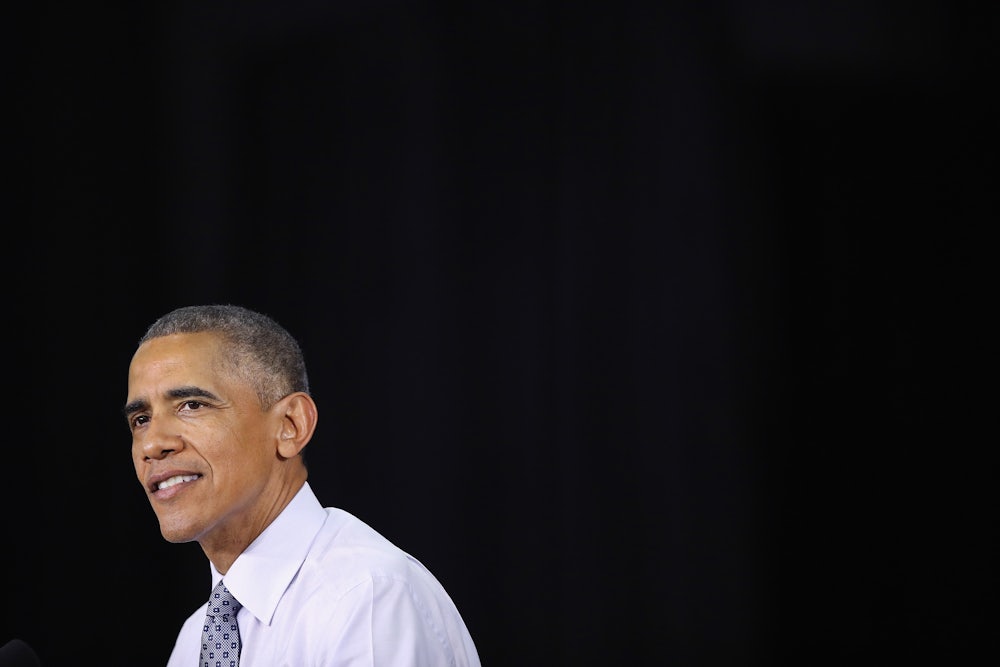In a speech this week in Indiana, President Barack Obama announced a major shift in his position on Social Security. “It’s time we finally made Social Security more generous and increased its benefits,” Obama declared, “so today’s retirees and future generations get the dignified retirement that they have earned.”
This is a welcome change from Obama’s past support for a so-called Grand Bargain that likely would have included cuts to Social Security benefits. It is tempting to view it as evidence of how Obama “really” thinks about the issue, in the same way that his support for gay marriage, after years of opposing it, was seen as a reflection of his real views. But the shift on Social Security isn’t about Obama per se. Rather, it’s an excellent example of how political pressure from below can facilitate change. It also demonstrates the limitations of a president’s ability to impose his vision on the country.
Until 2014, Obama’s budget proposals included an offer to reduce the growth of Social Security benefits by changing how the cost-of-living increase is calculated, in exchange for a deal including upper-class tax increases. Obama, in other words, has not only dropped even contingent proposed cuts, but is also calling for an expansion of benefits. This is a big deal.
Admittedly, on a substantive level, it isn’t much different from his previous position. Tying “chained-CPI” Social Security cuts to upper-class tax increases no Republican Congress was ever going to pass was an indication that Obama was not actually trying to cut Social Security. The idea was to propose “entitlement reforms” that Beltway journalists tend to love in a form that would ensure Republican rejection. I happen to think this was dumb politics—no special effort is required to make the Republican conference look rejectionist, and being even theoretically open to such cuts weakens the Democratic brand and diminishes the ability of Democrats to attack Republicans for going to war on Social Security. But there’s no reason to believe Obama had any particular commitment to cutting Social Security.
What has changed, then, is the politics. The leader of the Democratic Party believes it’s in his political interest to support expanding rather than cutting Social Security. The pushback against chained-CPI from both Democratic voters and many congressional Democrats was crucial in making this happen. And you can bet Obama has been paying attention to Bernie Sanders’s strong presidential run, too, which has shown there is an appetite for a stronger welfare state. He changed his public position on Social Security for the same reason he belatedly came out in support of same-sex marriage rights: that’s where the party was.
What’s interesting about this dynamic is that it is precisely the opposite of what should have happened according to a popular theory of political change that focuses on the president imposing his will on the public.
The “Overton Window,” posthumously named after the conservative think tank writer Joseph Overton, holds that there is a range of policy changes considered acceptable to the mainstream. Politicians are unlikely to step well outside of that window, so the center of gravity is crucial and attempting to move it is essential for transformative political change.
One variant of the Overton Window combines the idea with a belief in the power of the presidential bully pulpit. When presidents push for major policy changes, the theory goes, they win even if they lose in the short term. George W. Bush’s big push to privatize Social Security in his second term might have crashed and burned—but by moving the political center of gravity, it made some kind of privatization, or at least big Social Security cuts, more palatable.
But, in fact, Bush’s big push was, from a liberal perspective, the best thing to ever happen to the program. If anything, Bush’s failed initiative moved the political center of gravity on the issue to the left, making major cuts to Social Security benefits politically toxic.
Remember, Bill Clinton in his second term was open to at least some form of private accounts, and might well have cut a deal with congressional Republicans if not for the Lewinsky scandal. In contrast, while bad policy, the chained-CPI cuts Obama theoretically offered would not have fundamentally changed the program. And even theoretical Social Security cuts that had no chance of passing generated enough opposition within the Democratic Party to compel Obama to support expanding benefits rather than cutting them.
You can see a similar drift leftward on the Republican side, where there has been notably less enthusiasm about repeating Bush’s politically suicidal act. Paul Ryan’s 2011 budget, which called for a wide array of cuts as well as the privatization of Medicare, did not include any proposal for changing Social Security at all, instead proposing the kind of bipartisan blue-ribbon panel politicians call for when they don’t want to actually do anything. And the Republican candidate for president, Donald Trump, is not only against Bush-style privatization, but opposes Social Security cuts altogether.
Presidents proposing policy changes outside the Overton Window might make more radical changes seem plausible. It can also backfire and move the window in the opposite direction. The latter is what Bush inadvertently accomplished. There’s no empirical or theoretical reason to think that presidents pushing hard and failing to advance a policy directive is the path to political progress.
Policy change, in other words, rarely comes from the top of the party down. It comes from the bottom up. Barack Obama changed because of pressure within the party. And the pressure needs to keep coming to ensure that Hillary Clinton joins him.
